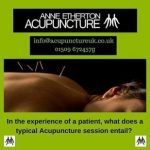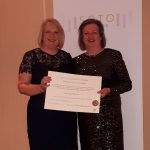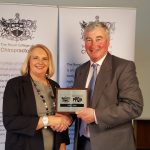We would like to give a warm welcome to Anne Etherton and Sarah Gunn Acupuncturists who will be moving their Wednesday and Thursday practices respectively to the clinic from 2nd May 2018.
Both are trained in acupuncture but Anne also does Chinese herbal medicine.
Anne is at Beeston on Wednesday and Sarah on Thursday afternoon.
Anne says “Chinese medicine is a medicine in its own right so although we are only given credit for pain control we also can treat most other ailments.”
Acupuncture is effective in the treatment of a wide range of conditions due to the fact that it can stimulate the body’s own healing process.
It can be used as a preventative measure when you feel generally ‘run down’ and also when you ‘feel unwell’, but you do not necessarily present with any symptoms – you just know you don’t feel ‘right’.
The aim of the treatment is not just to relieve symptoms, but also to improve overall wellbeing. Many patients notice not only changes to the condition they sought help with, but also improvements to their energy, confidence and quality of life.
For more information come and talk to them at our open morning on Saturday 28th April 2018 or visit their web site:
http://www.acupunctureuk.co.uk/acupuncture.html
More
Midlanders advised to keep moving to halt rise in back pain
New research finds increasing numbers of people suffering from back and neck pain
New research released to mark Chiropractic Awareness Week (9 – 15 April), has found that two fifths (41%) of people in the Midlands are currently experiencing back or neck pain, a 12% increase on 2017.
The research, which was carried out by the British Chiropractic Association, found that for sufferers in the Midlands, the top triggers for this pain were;
- Lifting or carrying heavy objects (53%)
- Sitting for long periods of time (43%), and;
- Poor posture (35%)
Notably, incidences of neck and back pain among younger people are also on the rise, with 40% of people in the Midlands experiencing neck or back pain by age 20.
Alex Newton comments on these findings:
“The BCA’s research findings align with what we see in our clinic on a day to day basis, however it’s particularly interesting that lifting and carrying was the most cited trigger for neck and back pain. It really highlights the importance of maintaining a strong and active body that can move well and cope with the demands you are making of it.
“For those who are finding that sedentary lifestyles and sitting for long periods are causing them a problem, we would encourage they make a change. We are designed to move and if you hold your body in any position for an extended period of time, it is likely that you will feel pain.
“To help counteract the effects of a sedentary lifestyle, and help prevent back and neck pain occurring, there are a number of simple exercises and small changes you can incorporate into your daily routine. For example, shrugging and circling your shoulders whilst sitting and taking the stairs are easy ways to improve your back health – these may sound simple but I know from my patients that they really work!”
Alex’s top tips to help local residents to prevent and manage neck and back pain are:
- Take a break: When sitting for long periods of time, ensure you stand up and move around every 30 minutes. When at work, also make sure your desk is set up to support a comfortable position. This is different for everyone so if you don’t feel comfortable in your current set up, try altering the height of your chair or screen.
- Keep on moving: Physical activity can be beneficial for managing back pain, however it’s important that if this is of a moderate to high intensity that you warm up and down properly to get your body ready to move! If a previous injury is causing you pain, adapt your exercise or seek some advice. Activities such as swimming, walking or yoga can be less demanding on your body while keeping you mobile!
Other things which you can bear in mind are:
- Lifting and carrying: Remember to bend from the knees, not the waist when lifting heavy items. Face in the direction of movement, and take your time. Hold the object as close to your body as possible, and where you can avoid carrying objects which are too heavy to manage alone, ask for help or use the necessary equipment.
- Sleep comfortably: The Sleep Council recommends buying a new mattress at least every 7 years. Mattresses lose their support over time, so if you can feel the springs through your mattress, or the mattress is no longer level, your mattress is no longer providing the support you need. Everyone has different support requirements, so when purchasing your mattress ensure it is supportive for you. If you share a bed and require different mattress types, consider two single mattresses which are designed to be joined together, to ensure you both get the support you need.
- Straighten Up!: The BCA has created a programme of 3-minute exercises, Straighten Up UK, which can be slotted in to your daily schedule to help prevent back pain by promoting movement, balance, strength and flexibility in the spine
More
General Data Protection Regulations: As from 25th May 2018 we have to be accountable for the data that we hold about you.
What does this mean for you?
Firstly during your next visit we will ask you to check the personal data that we have about you on your file and ask you if we can use your data for a number of reasons in relation to your care at the clinic – these will include using your phone number to call you or your email address to contact you, sending you text reminders to remind you about your appointments, storing you address details and that of your next of kin for emergency use, contacting your GP to help with your care, sending you these lovely newsletters by email every month and sending you a mail drop if we think you might be interested in something we are promoting.
You will be able to opt out of some of the above uses without it affecting your care at the clinic.
Look out in next month’s newsletter for more information.
More
We are very excited to be able to offer patients access to the Hydrotherapy facilities at the new David Ross Sports Village at the University of Nottingham.
They are offering group sessions (£15 up to 6 people*) or one-to-one sessions £40-£45.
Group sessions are currently Mon 10-11am, 7-8pm, Tues 7-8pm, Thurs 10-11am Fri 3-4pm.
* If you are interested in attending a group session arranged by us at Beeston Chiropractic Clinic at a different time to that shown above then please put your name on the list in reception.
Hydrotherapy is the use of exercise in a heated pool to treat a variety of conditions. At David Ross Sports Village the state-of-the-art Hydropool is heated to between 33 and 38˚C, allowing your body to relax, encouraging pain relief, better circulation, and improved flexibility.
Used by some of the top athletes in the country, hydrotherapy support the recovery process following training and competitive fixtures. The brand new facilities are ideal for athletes and performance sports teams to meet the demands of modern sport.
Aside from sports rehab and recovery, studies also show that hydrotherapy benefits patients rehabilitating from strokes, traumas, and other injuries as well as connective tissue diseases and asthma.
Talk to your chiropractor about the benefit for you.
More
We are inviting you to join us on
Saturday 28th April 2018
between 10am and 1pm
Something for everyone.
We are marking the occasion by raising money for a defibrillator for the outside of the building on Queens Road.
Tickets are on sale now £10 per adult under 16’s go free (maximum 2 children per paying adult) pop in to reception or call now (0115 9225085) to buy your tickets.
Payments can be made over the phone by debit or credit card too.
Choose a time slot that will be suit you 10am, 11am or 12 noon.
Spaces are limited so don’t miss out.
For the children we have a bouncy castle face painting and a skeleton game.
For the adults we have a quiz, challenges, a prize draw cake and bubbly.
Money raised will support the purchase of a Defibrillator for the outside of the clinic on Queens Road for community use.
Local businesses are kindly donating gifts for the prize draw.
See notice boards for a full list of business who have kindly offered donations
If you have a business that would like to donate please email: alex@beestonchiropractic.co.uk
Nottingham Wildlife Trust is the county’s leading conservation charity run by local people for the benefit of local wildlife and will be joining us at the event. They will share with you and your children the joys of nature and the wonders of our local wildlife.
Anne Etherton and Sarah Gunn will also be joining us and ready to answer any questions you may have about the wonders of Chinese acupuncture.
Please note the clinic carpark will be closed during the event! Please use public transport where you can or park on surrounding side roads. We have been offered a limited number of places at the Car Phone Warehouse . If we could ask that patients with mobility limitations only use these kindly offered spaces. Please park either side of the building with curtesy to other customers.
Thank you for your understanding.
More
Sacro-Occipital Technique (SOT) is a chiropractic technique first developed by Dr Bertrand DeJarnette (“the Major”) in the USA in 1925. Originally an engineer, DeJarnette suffered serious injuries after an explosion which eventually led him to spinal manipulative treatment, which he credited with subsequently saving his life. He was so impressed he went on to train as both an osteopath and a chiropractor in order to help others.
Once qualified as a chiropractor, DeJarnette felt that the classic chiropractic adjustment did not provide the full answer to better health. He then spent the next few decades performing clinical research to develop a unique approach to chiropractic treatment and health, based on normalising the relationship between the sacrum and the occiput. The technique includes detailed procedures for analysing and treating pelvic, spinal, cranial, visceral and extremity disorders using a specific indicator based protocol.
Alex has been practicing this technique since 1992 and only found time in these recent years to study for the examinations passing the Certified Examinations in September 2016 and the Advanced Certified examinations in September 2017. She is currently studying for her Craniopath Examinations.
She was awarded her certificates by the president of SOTO Europe Dr Ann McDonnell at the Gala Dinner in February. 
More
At this time of year we can all be guilty of comfort food binging but there are certain foods and substances that adversely affect the body’s use of minerals and vitamins. High saturated/animal fats, refined foods, white flour, white sugar, white rice, chocolate, carbonated drinks and fruit juices with high sugar concentration. So we need to start seriously starting to eliminate these from our diet. Meat and dairy products should be kept within a recommended weekly amount. Dairy products as calcium sources should be varied with other non-dairy sources.
It is estimated that 1 in 5 of us in the UK are Vitamin D deficient. For most of us we just can’t get the required amount of sunlight exposure to produce enough Vitamin D and it is impossible to get enough from food sources so supplementation is key.
Adequate levels of Vitamin D are required for normal functioning of the immune system, bones and teeth mineralization, muscle function, cell division and to enable us to utilization of calcium and phosphorus.
More
When we do exercise, usually snatched during an hour from a busy schedule, it’s followed by days of inactivity. This approach may well increase the risk of back and joint problems.
Stress is quickly manifested in the muscles and bones and can lead to joint dysfunction, especially in the spine. This can also cause persistent headaches, migraine, neck and back pain.
Stress – Free Exercise Tips
- Always do warm–up exercises to avoid straining muscles
- Exercise for at least 30 minutes at least three times a week
- Wear the correct trainers to soften impact, particularly when jogging or running on hard surfaces
- Try and monitor your heart rate when exercising – it should rise to about 80% of its maximum; it is easy to calculate your maximum heart rate by deducting your age from 220, therefore, if you are 40 years old, your maximum heart rate should be 180 beats per minute, 60-80% of this is about 110 to 145 beats per minute
- Warm–down your muscles by doing gentle stretching moves.
How about some walking?
A good walking technique is key to ensure your back is properly supported. Tighten your stomach muscles to engage your core and support your entire body weight. Spinal alignment is vital; try to stand up straight and keep your chin parallel to the ground. Let your arms swing naturally and roll through your foot from heel to toe.
As you move your body weight from heel to toe try and make a slight rolling motion inwards. This will help you when you push off with your foot and will give you a faster stride. Speed walking can burn as many calories as jogging especially if your posture is correct. Try and hold your ribcage up and your tummy muscles in.
It’s also a good idea to shorten your strides; this will reduce the strain on your knees, calves and shins. Make sure you get the right technique as you start off so that bad habits don’t develop! Getting the right footwear is key to ensuring you establish a good walking method. When buying shoes you’re going to walk in make sure you go at the end of the day as your feet will be a little swollen meaning you’ll purchase the right size. It’s important that your toes have room to move and that your heel doesn’t slip. This will give you ample support both in your ankle and further up in your lower back.
More
Clinic News:
The clinic received the PPQM (Patient Participation Quality Mark) awarded by the Royal College of Chiropractors at the AGM last month and Alex went to London to collect the award: The Royal College of Chiropractors believes that chiropractic services should be centred on the users of those services. The College supports the delivery of services that are flexible and responsive to the needs of patients, acknowledging them as partners in their own care. This is a team effort for us all to provide this service, so well done to the team for obtaining the award for the fourth time spanning a consecutive 12 year period.
Diary Notes: 25th Birthday news: 12 weeks to go: Saturday 28th April 2018 from10am-1pm. We will be raising money for a defibrillator for the outside of the clinic, to be placed we hope on Queens Road for the community to use. We will be raising funds by asking local businesses for a prize donation that we can use for the prize draw. Entry will be by pre-purchase ticket only and the party will include something for everyone to enjoy. Look out for more details in next months newsletter.
More
The body is fantastic at compensating for problems and you must have heard your Chiropractor tell you that the problem is somewhere different to where your pain is! And tightness in your calves can contribute to lower back problems!
Test your calf tightness:
(You will need yourself, your feet, a ruler, and a wall)
- Find a wall and place a ruler on the floor, measuring 10cm away from the wall
- On the leg being tested put your big toe on the 10cm mark facing the wall
- Keeping your heel on the ground (!) try to touch your knee to the wall
- Repeat on the other leg
How did you do?
If you failed the test you can simply start stretching out those calves, or ask you Chiropractor (this test will also pick up on ankle joint problems)
Happy stretching!
More




